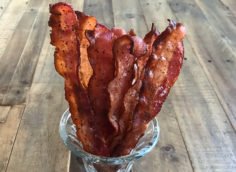An Unacceptable Amount of Muscle Loss
When you first start lifting, you learn a few basic facts. You learn to put weights equally on both sides of the bar lest you overload one side and catapult the bar into someone's chest. On the diet side, you probably learn that protein equals muscle, and muscle is precious and must be nurtured and preserved.
Dieting, however, robs you of both fat and muscle, unless you keep protein intake high to preserve the muscle.
Yeah, everybody knows that. Sort of. Unfortunately, few people really think about it seriously and any increased protein intake while dieting is often haphazard. The end result is an unacceptable amount of muscle loss. Rather than looking better, these haphazard dieters just end up looking like slightly smaller, still blobby versions of their fat selves.
Luckily, a study about dieting and protein intake from British scientists at the University of Birmingham gives us some specifics about protein intake during diets while simultaneously reminding us of just how important adequate protein is to successful dieting.
The Study
The scientists recruited 20 bodybuilders between the ages of 18 and 40. Prior to the study, the bodybuilders ingested about 1.6 grams of protein per kilogram (for a 200-pound bodybuilder, that equals about 145 grams of protein) per day.
All subjects were put on diets where they consumed 40% fewer calories than they normally burned each day. The first group of bodybuilders just ate less of what they normally ate. Proportionately, their protein intake thus fell to about 1 gram per kilogram per day.
The second group of dieters substituted protein shakes for carbs and fats and increased their daily protein intake to 2.3 grams per kilogram (about 207 grams for our hypothetical 200-pound lifter).
The Results
The group that ate 2.3 grams of protein per kilogram lost hardly any muscle mass; virtually all of their weight loss was comprised of fat.
The lower protein group, however, lost equal amounts of fat and muscle.
While the dieting didn't affect the 1 RM (the most weight they could lift for one rep) bench press of either group, the high-protein group managed to do a few more reps at 60% of 1 RM. And while the low-protein diet reduced dieters' levels of free testosterone by 26%, the high-protein group only experienced a 7% reduction.
What This Means To You
When hard dieting or just leisurely, half-ass dieting, you need to make sure that you're at least getting 1 gram of protein per pound of bodyweight. Looking at it a different way, protein should comprise about 35% of your caloric intake.
This isn't all that much by bodybuilding standards, but it's easy to get away from you if you're not being mindful of your macros while dieting. Some lifters, while dieting, just get into this Spartan mode where they pretty much just stop eating. Unfortunately, these same people also stop thinking, mistakenly assuming that they'll wake up ripped and full-muscled when their dieting stint is over.
Additionally, unless you're Joey Chestnut, getting 200 grams of protein from whole food is damn hard. It would require eating 5 or 6 chicken breasts, about 30 eggs, 5 or 6 steaks, or around 8 hamburgers. Burp city.
The inescapable conclusion, based on common sense and experience, is that protein shakes are an indispensable part of dieting. They make getting 1 gram per pound of bodyweight pretty easy. Choose one with a high quality blend of proteins that includes micellar casein, like Metabolic Drive® Protein.
Source
- Mettler S, Mitchell N, Tipton KD, "Increased protein intake reduces lean body mass loss during weight loss in athletes." Med Sci Sports Exerc. 2010 Feb;42(2):326-37.




